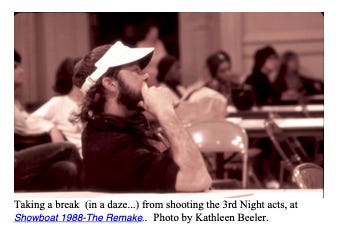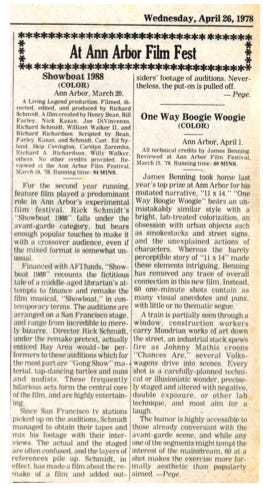CIGARETTE WAR (1978. This "Showboat" short story first appeared in my memoir, TWELVE DEAD FROGS, later excerpted to SLEEPER TRILOGY, about how one's success or failure in ART is so fragile & ironic.
CIGARETTE WAR (1978)
With what I believed was a final cut of Showboat 1988 (reached in 1978 after three years of hard editing and raising completion funds) I decided to use my last $200 for a trip to Michigan, to enter the Ann Arbor Film Festival with my only print of Showboat 1988 (hundreds of potentially breakable double-sided splices basically required that I accompany the one-and-only copy I had––all that I could afford!). I would hand-carry the print right to the selection committee, making sure that I didn’t lose it through the mail. I hoped that this test before unfamiliar audiences might make all the pain of editing worthwhile.
My girlfriend, artist Julie Schachter and I had been seeing each other regularly by then (we married in 1980), and she agreed to take over my childcare responsibilities for the two weekends in that early March while I traveled to the festival. My kids had already gotten used to her, so I knew everything would be fine. It was great to be in love and also have a film!
In Ann Arbor, I was housed by the ex- husband of Anne Wehrer, the woman who had helped me survive my first film sojourn to New York, after the completion of my first feature, A Man, A Woman, And A Killer, in 1975 (see “New York Distributor” section, page 279, TWELVE DEAD FROGS: ). In any case, I was suddenly meeting an intriguing group of Ann Arbor artists, men and women in their forties and fifties of whom I had heard about from Anne and our mutual friend, Mary Ashley. Their legendary “Once Group” had spawned important artists like New York’s Robert Rauschenberg. At the core of the group in Ann Arbor was George Manupelli, who had founded the film festival and was its current director. George and I had met once before, in Death Valley, California in the early 1970s. And, of course, he had given me that great tip of how to employ soft-lights for the shoot of A Man, a Woman, and a Killer (1973).
One day, as I sat in the lounge with Manupelli and about fifteen others of the festival clique, he started laying into me out of the blue, saying how I had done the meanest thing to him, something meaner than anything anyone had ever done before, in his entire life. Luckily, I was confident enough as a person at this point (I had the film!) that I was able to regard the first stages of his diatribe as just what it appeared to be––a little art game. Gradually, he gained everyone’s attention as he described in detail how I, the “biggest shit in the world,” had withheld his cigarettes during an LSD trip we were on together in Death Valley.
As he carried on, I tried to recall the incident. I knew that I hadn’t taken much LSD that time, maybe a quarter of a tiny “window pane” of the drug, but I did remember telling George that he didn’t need to smoke, that he was better off without cigarettes.
It suddenly came back to me how I’d held his pack of cigarettes in the air, out of his reach. I also seemed to remember something about him having crutches, for mobility with a broken leg or something. Watching him try to navigate rocks and the changing terrain of the desert, and light cigarettes at the same time, had prompted me to try and convince him to forgo the smoking. And as I recall, he had. Of course, I had no idea that he’d been harboring such resentment ever since.
As he built up momentum, focusing everyone’s attention on this dumb issue, Manupelli actually started to upset me. With all the little nods and side comments of the encircled group I suddenly felt like they were ganging up on me. Before I could do something to turn it around, laugh, get up, or fart (anything), Manupelli moved in for real blood.
In front of the entire group he asked, “What makes you think your film will even get shown here?” It was at this point that it stopped being funny at all. This was hitting below the belt.
“I can guarantee you that your film will never be shown at Ann Arbor,” George added, grinning. And everyone in the circle agreed, nodding and saying things like, “That’s right.”
Like a doomsaying Greek chorus, they all mumbled in unison that I’d done George a terrible injustice, and now I had to pay the price. Keep in mind that this little group consisted of all the Ann Arbor Film Festival hierarchy, the selection committee, the judges, the whole shooting match.
I left the room shaken. I knew that part of what I had just experienced was just a strange type of psychodrama/art performance, a mind-game juxtaposing art with real life, of which Manupelli was a master. So I shouldn’t have been bothered, right? But no one could have imagined all the hell I had gone through just to have a chance to see Showboat 1988 projected on a movie screen before an audience. I knew I didn’t deserve any special considerations beyond being judged fairly by the selection committee, but I still prayed that I would at least see my film shown before I left Michigan (I had bought a one-way ticket and didn’t even know how I would pay for the flight home). And even if it was selected I wasn’t sure that the tape splices would hold, couldn’t guarantee that the film wouldn’t unravel, break apart sometime during its hour and a half show. How many more disappointments would I have to endure for this one film, I wondered? I had struggled with it for almost three years.
While wandering around in the snow (what was I doing in Ann Arbor, Michigan, anyway?) I got the idea to just buy Manupelli a bunch of cigarettes as a peace offering. I located a nearby tobacco store and bought a carton of his special brand of Players cigarettes, the kind he’d so proudly displayed during my inquisition. I opened up the carton and emptied all the loose packs into my carryall bag. I would make sure that he felt paid back in full.
During the course of the day, and into the evening, whenever I encountered one of his cronies, the people who had sat in on my “circle of shame,” I gave them a cigarette pack, asking them to please just give it to him without bothering to tell it was from me. By going through his friends in this way, I thought I could undo some of the damage before he had a chance to retaliate. I worried that he might use this cigarette-payback for more grandstanding, and wasn’t emotionally ready to deal with that. Fortunately, each person I met seemed happy to oblige, picking out a fresh, unopened pack of Players from my bag with a twinkle in their eyes. I didn’t realize that these high-powered friends of Manupelli’s were, themselves, experts in the parlor game we’d played. They each knew how to survive initiation rites and eat their own.
So all during that big opening night of the film festival, Manupelli’s friends slipped him my packs. When he offered someone a single cigarette they would take it and later return an unopened pack. Because he was on automatic pilot, and drinking heavily, he didn’t notice the difference. When he offered someone a half- opened pack to bum a cigarette they would return an unopened pack, and a minute later his half-full one. Each of these artists put a slightly different spin on the process of giving him my cigarettes, pushing the concept to a limit far beyond anything I had envisioned. Soon, in his super-inebriated state (many beers and films later), Manupelli was having trouble finding any available pockets for cigarettes. He hadn’t noticed that he’d been filling up with more and more packs all evening. He would squirm first right, then left, reaching for back pants pockets (already full to the brim!), trying to cram packs down upon other packs. The noose was tightening.
At some point things hit the wall–– Manupelli absolutely could not find an empty pocket anywhere for the unopened pack in his hands. At that point, some spark of consciousness told him he’d been had.
When he saw me next, across the hall during a film’s intermission he was in shambles, stuttering, calling my name loudly, squawking like a trapped parrot.
“HI RICK!
“WANT A CIGARETTE? WANT A CIGARETTE?”
He was drunk, confused, but not so disoriented that he didn’t realize through all the fog that I had been the instigator of his torment (again!), and with some measure of artistic grace. Touché. I had finally won back my stripes.
The next day Showboat 1988 won 1st Place, and most importantly, $200, which I used to fly home. A week later the print headed out, splices and all, for the national Ann Arbor tour where it won several more cash prizes. And Variety gave it a glowing review, saying, “The auditions range from incredible to merely bizarre,” ending with, “...the put-on is pulled off!”





Wow!! Just ... WOW! That is a great story on so many levels. I'm not sure I could have weathered an emotional storm like you endured. Amazing. And with a happy ending!! 1st place and a plane ticket paid for!